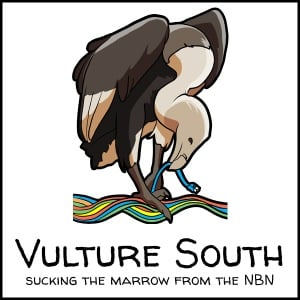This article is more than 1 year old
NBN study: we didn't make it, but may have made a point
Vulture South's attempt to improve NBN debate have ended … for now
A little over a month ago, The Reg's Australian outpost tried to raise $AUD100,000 to fund a study into Australia's National Broadband Network (NBN).
This is The Reg so we're not going to spin it: the $AUD7,216 pledged is a long way short of success. We hoped to hit the target because the team, here in Australia and at London HQ, felt the study would be genuinely useful.
We also feared success a bit, because just getting the idea to the starting line involved a big effort. A mountain of work would have been required to pull it off.
Even though we didn't hit our targets, we still believe the exercise was worthwhile, because debate on the NBN remains unproductive.
During the life of our crowdfunding campaign, the ITU announced 2015 delivery of the gigabit-over-copper G.fast standard. G.fast's existence shows fibre to the premises is not the only way to deliver gigabit speeds. That's surely something to consider in the context of the current government's insistence that only fibre-to-the-premises is a wise investment.
The ITU's sign-off of the first components of G.Fast hardly rated a mention in Australia, where coverage of the NBN continued to delight in news of delays and disputes.
Also during the life of our project, the OECD's bi-ennial Communications Outlook pointed out that wired networks will have more, not less, work to do in future because they are not likely to shed their role as the main carrier of data to and from mobile devices. Quite where that leaves Australia's Opposition, and its plan to build a fibre-to-the-node network because it is cheaper and wireless may one day make fibre-to-the-premises wasteful, is anyone's guess.
Also during the campaign's life, we had news of competition issues with BT's FTTN network and a new UK FTTP service running at a deemed-to-be-just-fine 300Mbit/s. As the UK's broadband infrastructure experience has been held up as something for Australia to consider deeply, again we feel an independent study could have helped to advance debate.

We'll never know how our study would have influenced debate.
We do know the idea would not even have been possible without exceptional support from our two analyst partners, IBRS and Market Clarity, both of whom were kind enough to have a punt with and on us. Both offered us proposals of the same quality they'd present to paying customers, an act of generosity we appreciate deeply.
And of course a big thanks to those who pledged their support: your decision to do so gave us much pleasure and encouragement.
This isn't the end of our exploration of the NBN. The Vulture South team will continue to explore the topic and try to address the questions we hoped the study would answer. ®
Bootnote
One last thing: while we acknowledge we fell a long way short of our goal, consider the efforts of two announcers on Sydney radio station 702. Between them, Adam Spencer and Richard Glover have an audience of hundreds of thousands every day, and get that audience's attention for many minutes. Yet over the 22 days, at the time of writing, they've been spruiking their participation in the “Dry July” charity, they've together raised just over $10,000. We reckon if you squint the right way, do some maths with audience size, quantity of attention and revenue raised, Vulture South might just come out in a handy position.
